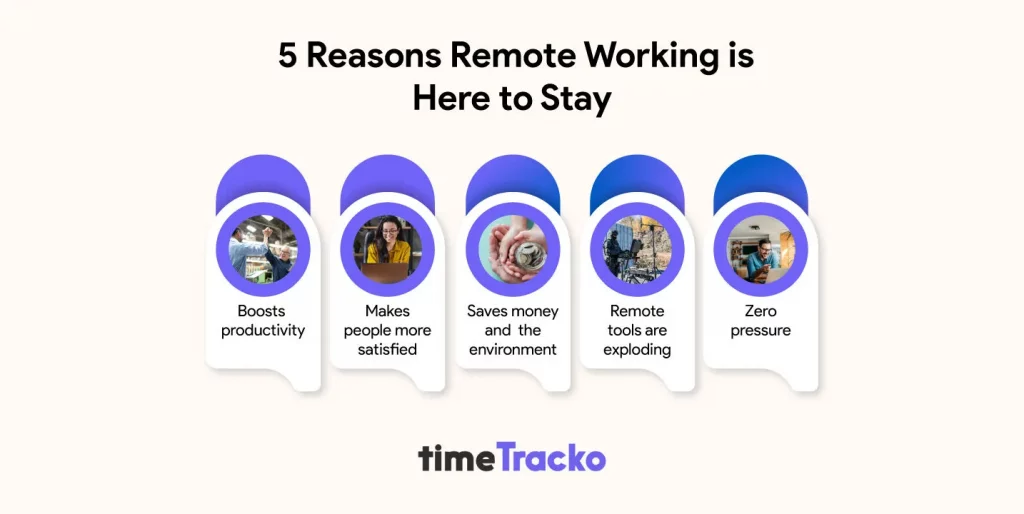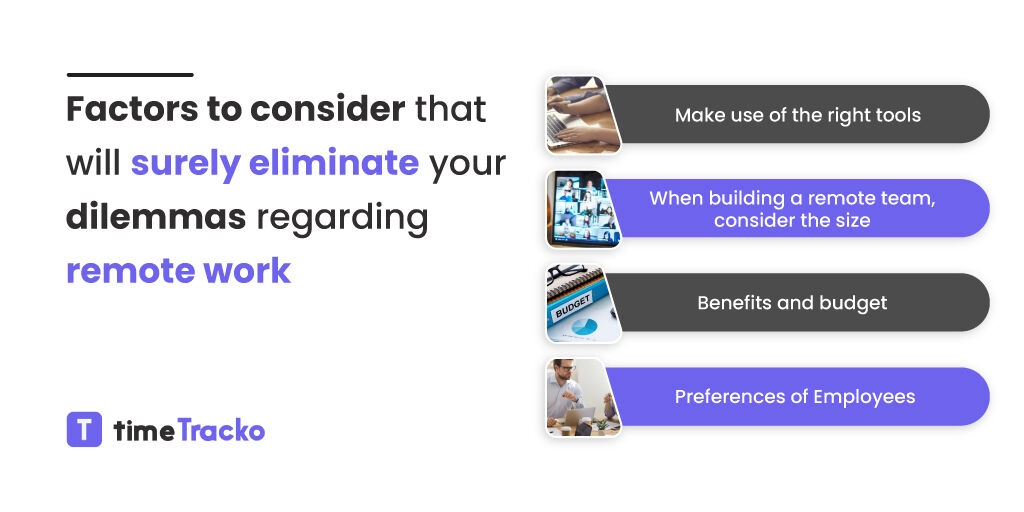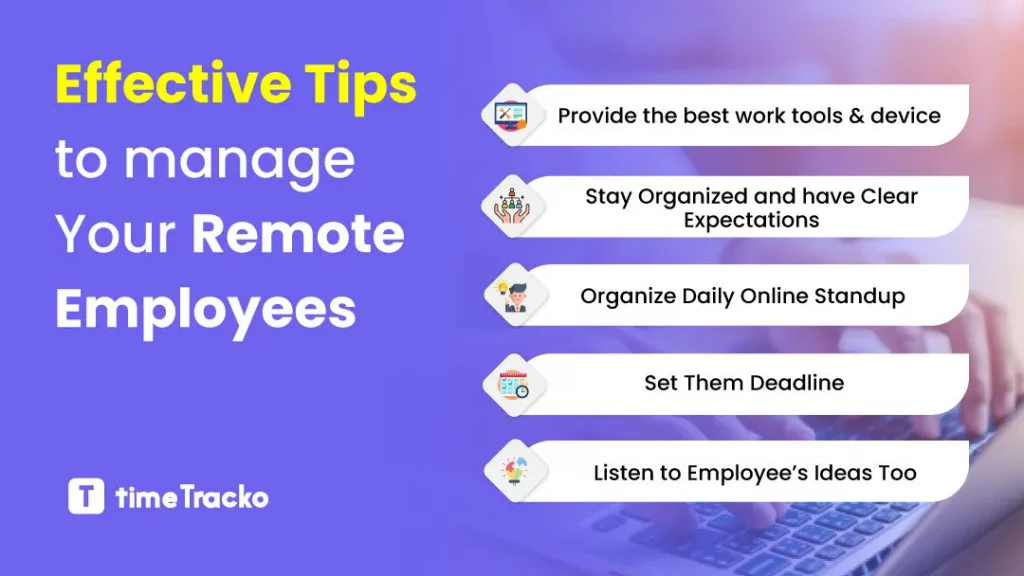How to Build Trust on a Remote Team?
How to Build Trust on a Remote Team?
Whether you’re an employee, a manager, or a company leader, it’s important for you to learn how to build trust at work. You will have a hard time communicating and coordinating with colleagues or peers if you don’t have any trust. In an extreme situation, a lack of trust can even lead to the downfall of a team or organization.
Also, because of the COVID-19 pandemic, many employees were forced to integrate both their personal and professional lives into one remote office. A lot of business models have had difficulty adjusting to new work processes and routines.

Undoubtedly, the COVID-19 pandemic has brought remote work, and its countless challenges, into sharp focus. One of the major challenges faced by every employee is “How to build trust with remote teams when the manager is not physically present?”

The one question that managers have constantly in their mind is, “ How do I know if remote employees are working?”
Similarly, remote employees, in turn, may constantly think, “How can I show my manager that I am getting work done?”
There is for sure a lack of trust between you two if you also think like one of those people do. Trust is hard to build for most people because most people haven’t been taught.
Let’s first dig into the topic of what high-trust culture is.
What is High-Trust Culture?
The key to a successful remote work strategy is having a fully-functioning, high-trust culture. Since mutual respect is the basis of trust and fairness, they foster collaboration and creativity. Aren’t we all glad when we are treated like the grown-up professionals we really are? We know we do!
Words, actions, budgets, and stories can be used by managers to establish trust in their organization. Some of the signs of high-trust culture are:
- Values such as integrity, safety, honesty, empathy, and kindness are being promoted in the company.
- Every employee is treated with respect.
- Employees are trusted and encouraged to make decisions on their own.
- Feedback rounds are conducted regularly.
- Fairness is seen as fundamental at work.
- It is important for leaders to lead by example.
- There is an atmosphere of camaraderie and collaboration among the employees.
Furthermore, research done by Harvard found that the Employees at high-trust companies experience 50% of greater productivity, 74% of less stress, and 76% of more engagement.
Why Trust is a Big Deal For a Remote Team?
According to researchers in social psychology, there are two kinds of trust: cognitive and affective. Affective trust takes place in your heart, based on feelings of empathy and emotional closeness. Cognitive trust occurs in your head, based on belief in another’s skill.
Due to the lack of personal interaction, it is harder to establish effective trust in a remote setting, but it isn’t impossible to do so. Hence, distributed teams need to be more diligent and approach their trust challenge differently.

Trust is important in a remote team for the following reasons:
- A high-trust environment tends to be less stressful than one where employees doubt each other.
- When trust exists, employees are more productive and conflict is less likely to occur. This means that team members won’t need to waste their time arguing.
- Trust boosts the productivity of the team and it is more pleasant to work in an environment when a manager trusts his or her team members.
- Those who are satisfied with their job and feel they can trust their manager and co-workers are more likely to have a better outlook on life.
9 Best Ways to Build Trust For a Remote Team

1. Aligning Your Team’s Purpose and Motive
Having a common purpose and the motivation to perform well on the team naturally lead to trust. Team members should be encouraged to establish a strong “trust triangle“, consisting of the three aspects of common purpose, competence, and motives.
Learn More:- Motivate Your Employees with These 10 Tips💪💪
Our trust in others is influenced by each of these three factors. In the absence of knowledge of someone’s motivations, we tend to assume the worst. So, we need to ensure people see our motivations and intentions as altruistic and for the benefit of the team.
2. Communication and Use of Right Medium For Your Message

Trust can be eroded by communication breakdowns, especially in remote environments. It’s common for emails and phone calls to be misunderstood, and even video calls can be hindered by time delays and frozen screens.
So, to communicate effectively, we need to use the right tool for the job, which means we should select the media that is most likely to communicate our message and not the one we prefer the most.
Learn more:- Importance of Team Collaboration🧑💼
3. Amplification of Human Skills
A shift to remote work, resulting from the pandemic, made soft or “human” skills even more important. People at all levels of organizations are now required to practice critical listening, empathy, transparency, and accountability.
In the days prior to the Pandemic, when working from home was merely a trend, you could see that there was something wrong if someone cried at work, and you might inquire as to what the issue was.
But, now you’ll need to be able to understand when someone is having a problem, and also empathize with them.
For instance, if you have a member of your team who is suffering from poor mental health and the level of trust is low, they will never be able to open up to you about any issues.
Therefore, to motivate team members to prioritize their wellbeing, leaders need to vocalize about taking time for themselves (maybe it can be taking a long lunch break, or leaving early to spend time with family) and then inspire others to do the same.
Learn more:- How To Support the Mental Health of Remote Workers 🧑⚕️
4. Avoiding Blame Culture

It’s a sign of remote work conflict if there is a lack of trust between employees and members of your team who are quick to point the finger at each other.
In a company where the manager blames the employees or the employees blame the manager or the employees blame one another, then staff may leave their job because they may find it difficult to ask for assistance and they may not believe in the leadership.
Hence, managers and leaders should create an environment that gives team members the confidence to come to them with problems without fear of repercussions, especially in the remote work culture.
Learn More:- Ways to Bring Your Employees Together
Also, leaders should invite everyone and involve them to take part in the solution when an issue arises or when the organization wants to reset its values.
5. Organizing Team Meetings Regularly
Meetings provide people with a chance to be heard, informed, and express their views. Your team members will interact more frequently with each other if you arrange regular remote meetings. Once people learn more about each other, they are more likely to trust each other.
Additionally, you can plan a less formal meeting now and then. This could be your online take on happy hour or a casual team meeting. It’s a fun way to meet the team. For instance, take advantage of video conferencing during coffee breaks to make employees talk casually and informally.
Learn more:- Advantages and Disadvantages of Virtual Meetings
6. Being Open And Accepting Each Others’ Mistakes And Vulnerabilities
It is common knowledge that openness leads to trust. Human beings make mistakes. They have their vulnerable sides. When the members of a team are more open to the mistakes of their team members, then the team members will be more trusting of each other.
A remote employee may not understand a new software introduced by the company and thus make a mistake. Someone may leave a virtual meeting abruptly due to connection problems. Such things are common when working remotely.
It is when team members openly accept these vulnerabilities and mistakes of their colleagues that trust can be built in a remote team.
7. Creation of a Sense of Unity

Unity is important in virtual teams. If the team members feel like they’re part of the team, they’ll work harder. This victory will benefit the entire team. This is called “swift trust,” which occurs when individuals rely on one another even if they are strangers.
You should figure out the talents and abilities of each team member to create a sense of unity. Consequently, when everyone in the team shows off their best skills and abilities, the outcomes will be excellent.
Learn More: Importance Of Team Collaboration At Work👋👋
8. Avoiding Micromanagement
Micromanagement is one thing that needs to be avoided if you want to build trust on a remote team. No employee likes their managers or leaders micromanaging their affairs.
Unlike in an office where the work environment is different when employees are performing remote work in a calm home environment, they are even more sensitive to micromanagement and are less accepting of others coming into their affairs.
Although a certain level of supervision is necessary, micromanagement makes employees lose trust easily as they feel that whatever they do is not enough.

So, instead of micromanaging each and every affair of their employees, managers can instead use employee monitoring software timeTracko to manage the employees remotely without losing much of their trust.
9. Making Transparency the Moto
Employees’ trust in a leader is directly influenced by the level of positivity and transparency of the leader. While working remotely, sometimes it can be easy to accidentally hold back information or forget to provide enough context for teammates.
But however, it is important that managers communicate every detail and provide all the information their reports need.
The majority of remote teams communicate using a team chat tool like Slack. Encouraging the use of public channels to communicate with people instead of using chat tools like email is important so that each individual can contribute equally to crucial decisions and feel included in discussions.
Learn More:- Tips To Make Your Team More Transparent🏆🏆
Also, the key takeaways from private discussions should be made public for the team even if they were held privately.
Final Words
The perception that remote workers will not be effective without a manager watching their back leads to two problems:
- Managers tend to micromanage their employees
- To demonstrate their productivity, employees tend to overwork
The answer to both of these concerns is to Build a Culture of Trust!

 in Melbourne
in Melbourne 
 Employee Screen Monitoring Software
Employee Screen Monitoring Software App and Website Monitoring Software
App and Website Monitoring Software Time and Attendance Software
Time and Attendance Software Finance
Finance Banking
Banking Healthcare
Healthcare Lawyers
Lawyers Retail & ecommerce
Retail & ecommerce Knowledge base
Knowledge base Blogs
Blogs Installation Guide
Installation Guide FAQs
FAQs About
About Media Kit
Media Kit Contact us
Contact us